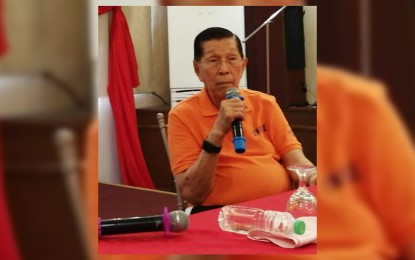
Former senator Juan Ponce Enrile.
MANILA -- The Supreme Court (SC) has cleared personalities identified with the late President Ferdinand Marcos, including former senator Juan Ponce Enrile, of criminal liability over loans granted over half a century ago by the Philippine National Bank (PNB) to a sugar firm.
In a 15-page decision by Associate Justice Jose Reyes Jr. last March and made available recently, the SC’s Second Division denied the petition for certiorari filed by the government through the Presidential Commission on Good Government (PCGG).
Also cleared were then PNB directors Roberto Benedicto, Antonio Diaz, Ismael Reinoso, Simeon Miranda, Renato Tayag, Juan Trivinio, Cesar Virata, Jose Macario Laurel IV, and Jose Leido.
Likewise, the Court also cleared Rafael Perez and Felicisimo Gonzalo, both former PNB-Dumaguete branch managers, and the officers of Tolong Sugar Milling Company Inc. (TSMCI) namely Ramon Escafio, Herminio Teves, Evelina Teves, Lorenzo Teves, Catalino Noel, and Lamberto Macias.
The PCGG sought a second look by the High Court to a resolution issued by the Office of the Ombudsman on December 29, 2006 dismissing the criminal complaints for lack of probable cause.
Associate Justices Mariano del Castillo, Estela Perlas-Bernabe, Alfredo Benjamin Caguioa and Amy Lazaro-Javier concurred.
The Court said the Office of the Ombudsman correctly dismissed the complaint for violation of the provisions of Republic Act 3019 or the Anti-Graft and Corruption Practices Act filed by the PCGG.
“No grave abuse of discretion may be attributed to the Ombudsman merely because of its alleged misappreciation of facts and evidence. The petitioner in a certiorari proceeding must clearly demonstrate that the court or tribunal blatantly abused its authority to a point so grave as to deprive it of its very power to dispense justice,” the Court ruled.
“In this case, the PCGG failed to show that the Ombudsman gravely abused its discretion when it dismissed the criminal complaint against the respondents. Instead, the instant petition is bereft of any statement or allegation purportedly showing that the Ombudsman exercised its power in an arbitrary or despotic manner by reason of passion or hostility… Consequently, the instant petition must be dismissed,” it added.
The PCGG said TSMCI’s was one of the many companies investigated by the Presidential Ad Hoc Fact-Finding Committee’s Technical Working Group (TWG) for possible prosecution arising from behest loans.
TWG's probe concluded that on March 20, 1968, PNB granted TSMCI a stand-by irrevocable unconfirmed letter of credit of USD27,793,123.45 or PHP108.91 million to cover importation of sugar machinery and equipment in connection with TSMCI's proposed sugar central at Sta. Catalina and Bayawan, Negros Oriental.
The loan was granted under PNB Board Resolution 711, dated March 20, 1968, and was purportedly secured by 51.2496 hectares of agricultural land; machinery and equipment, building and other improvements to be erected and/or installed in the company's, milling site; 3,000 hectares of central-owned and operated sugar plantation; and joint and solidary surety executed by TSMCI's officers.
However, the TWG discovered that at the time of its incorporation on May 10, 1967, TSMCI only had subscribed capital stock amounting to PHP2,000,000, of which only PHP500,000 was paid-up; that it only had capitalization in the amount of PHPl0,000,000; that the lands covered by the loans were appraised by PNB Dumaguete Branch at PHP22,350 only; and that the two parcels were not titled or registered in the name of TSMCI.
The PCGG claimed that its findings that it only had a paid-up subscribed capital stock amounting to PHP500,000, had insufficient capitalization as well as insufficient property registered in its name to back the loans substantiate that TSMCI’s account was a behest loan.
The Ombudsman had, however, held that the PNB Board of Directors “exercised proper caution to ensure the chances of payment and that the loan was not under-collateralized,” contrary to the allegations by the PCGG.
“As pointed out by the Ombudsman, the complaint-affidavit is bereft of sufficient allegation and relevant documents to support the charges therein,” the SC said. (PNA)
